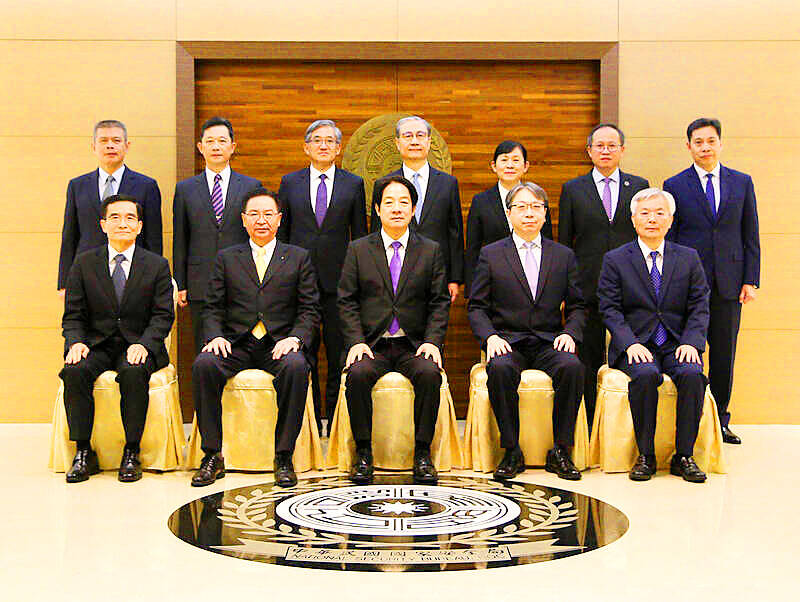The National Security Council (NSC) has published its information security strategy for this year, which includes establishing a national center to monitor security risks and outlines three major goals for enhancing the nation’s critical infrastructure security.
The council’s strategy highlights the importance of protecting critical infrastructure — including water, electricity, communications, transportation, finance and healthcare systems — from cyberthreats.
Disruptions to these systems caused by cyberattacks could paralyze society, severely impact the economy, jeopardize public safety and disrupt daily life, the NSC said. Such incidents would also erode public trust in the government and threaten national stability.

Photo coutesy of the National Security Bureau
The strategy emphasizes that information security is crucial in safeguarding the military’s operational command system, ensuring that facilities, equipment, communications and decision-making processes remain free from external interference.
Information security is a critical extension of national defense and military strategy, the council said.
The military must be able to counter cyberattacks to prevent adversaries from compromising defense systems, stealing sensitive information or crippling operational capabilities, the council said.
Homeland security and the protection of critical infrastructure constitute one of the strategy’s four central pillars, supported by three primary objectives.
The first objective is to conduct comprehensive assessments of potential information security risks and develop countermeasures to bolster critical infrastructure protection and defense readiness.
The second aims to strengthen national defense, public welfare, disaster preparedness and democratic resilience through robust regulation and enforcement of cybersecurity standards.
The third objective is to enhance information security preparedness to safeguard national security and ensure regional peace and stability.
As a concrete step, the strategy calls for the establishment of a national information security center to monitor nation-level security risks. The center would bolster interagency coordination and response mechanisms, ensuring that resources can be rapidly mobilized to address major cybersecurity incidents, it said.
The strategy also said the government should clearly define information security objectives and requirements for defense and law enforcement agencies, and recommends prioritizing the allocation of resources toward intelligence gathering, threat analysis, and the development of proactive defense capabilities.
In addition, the strategy recommends that the government conduct a comprehensive inventory of key agencies and critical infrastructure facilities, categorize them by risk level, and regularly review them to ensure compliance with security regulations.
It also calls for stronger oversight of critical infrastructure facilities, enforcement of incident investigation and accountability mechanisms, and the assurance that all agencies meet established information security standards.
National security and information security agencies should work with critical infrastructure operators to implement a comprehensive action plan aimed at enhancing network resilience, it said.
The strategy also urges the establishment of an interagency coordination platform to strengthen operational resilience during emergencies.
Furthermore, it proposes the creation of a dedicated information security protection team to be able to rapidly respond to emergencies involving critical infrastructure.
Third-party information security drills and tabletop exercises should be established to test and verify information security defense and response mechanisms, it said.

A Ministry of Foreign Affairs official yesterday said that a delegation that visited China for an APEC meeting did not receive any kind of treatment that downgraded Taiwan’s sovereignty. Department of International Organizations Director-General Jonathan Sun (孫儉元) said that he and a group of ministry officials visited Shenzhen, China, to attend the APEC Informal Senior Officials’ Meeting last month. The trip went “smoothly and safely” for all Taiwanese delegates, as the Chinese side arranged the trip in accordance with long-standing practices, Sun said at the ministry’s weekly briefing. The Taiwanese group did not encounter any political suppression, he said. Sun made the remarks when

The Taiwanese passport ranked 33rd in a global listing of passports by convenience this month, rising three places from last month’s ranking, but matching its position in January last year. The Henley Passport Index, an international ranking of passports by the number of designations its holder can travel to without a visa, showed that the Taiwan passport enables holders to travel to 139 countries and territories without a visa. Singapore’s passport was ranked the most powerful with visa-free access to 192 destinations out of 227, according to the index published on Tuesday by UK-based migration investment consultancy firm Henley and Partners. Japan’s and

BROAD AGREEMENT: The two are nearing a trade deal to reduce Taiwan’s tariff to 15% and a commitment for TSMC to build five more fabs, a ‘New York Times’ report said Taiwan and the US have reached a broad consensus on a trade deal, the Executive Yuan’s Office of Trade Negotiations said yesterday, after a report said that Washington is set to reduce Taiwan’s tariff rate to 15 percent. The New York Times on Monday reported that the two nations are nearing a trade deal to reduce Taiwan’s tariff rate to 15 percent and commit Taiwan Semiconductor Manufacturing Co (TSMC, 台積電) to building at least five more facilities in the US. “The agreement, which has been under negotiation for months, is being legally scrubbed and could be announced this month,” the paper said,

Japan and the Philippines yesterday signed a defense pact that would allow the tax-free provision of ammunition, fuel, food and other necessities when their forces stage joint training to boost deterrence against China’s growing aggression in the region and to bolster their preparation for natural disasters. Japan has faced increasing political, trade and security tensions with China, which was angered by Japanese Prime Minister Sanae Takaichi’s remark that a Chinese attack on Taiwan would be a survival-threatening situation for Japan, triggering a military response. Japan and the Philippines have also had separate territorial conflicts with Beijing in the East and South China